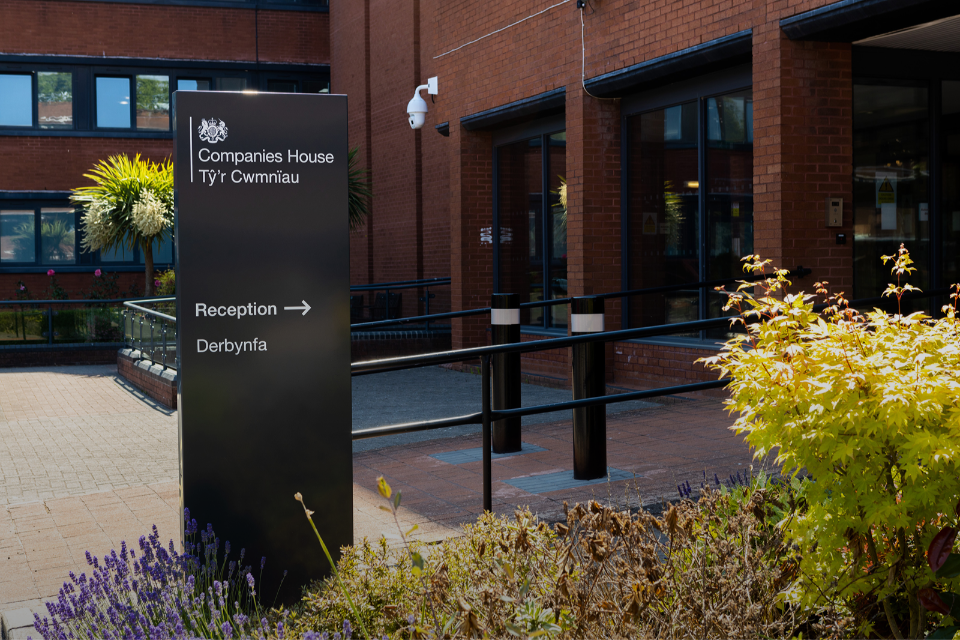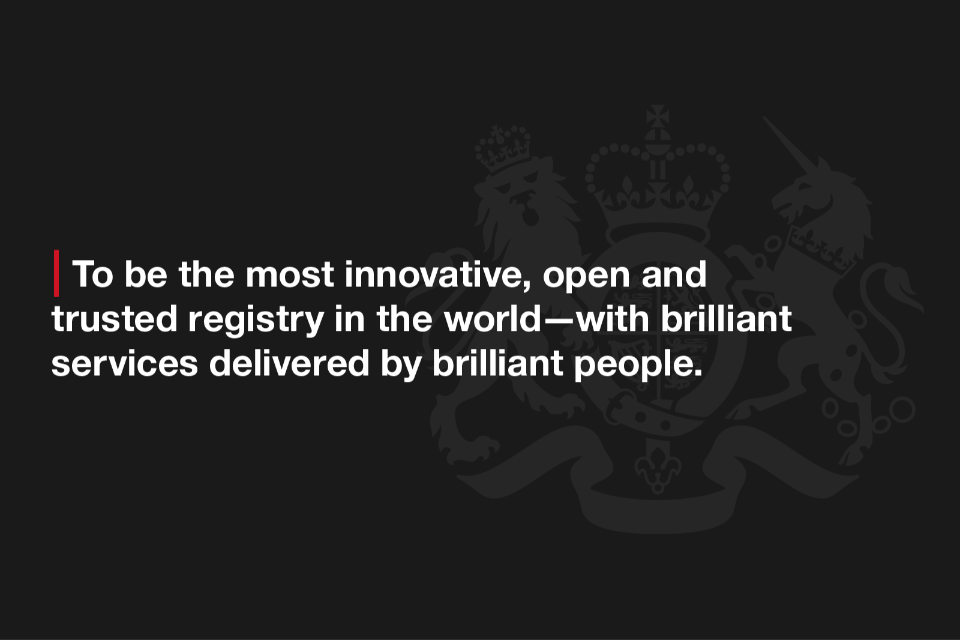Companies House business plan 2024 to 2025
Published 12 August 2024
Chair and chief executive’s foreword
As we begin the fifth and final year of delivering our 2020 to 2025 strategy, we are hugely excited to embark on the first stages of implementing the landmark Economic Crime and Corporate Transparency Act 2023. It is without doubt one of the most significant moments for Companies House in our long history.
We have known for some time that UK companies have been misused by criminals to commit fraud, money laundering, and other forms of economic crime, and our thoughts have always been with those affected. With the legislation in place that has given the registrars new and enhanced powers, we will now be able to take unprecedented steps to crack down on fraudulent activities, help victims of identity fraud more quickly, and clean up the register by removing information we know to be incorrect or misleading.
These new and enhanced powers enable us to prevent further abuse of the register and to play an even greater role in the cross government approach in identifying, disrupting and preventing economic crime.
This will underpin our efforts to drive up the accuracy of the information held on the registers – improving the quality and reliability of our data which, in turn, will increase the value of the registers for businesses across the UK and beyond.
We will be focusing our attention this year on the highest priority areas of legislative reform and will be further ramping up our work in implementing the significant changes to our processes and systems. Our teams will be bringing in new ways of working and we will be testing, learning and evolving our skills and practices at pace to deliver on our new role.
Our ambition is clear – to act as quickly as possible in implementing the legislation and start to make a real difference. However, we have also been clear that we will continue to take a phased and prioritised approach to introducing these changes. Some changes will need a significant amount of secondary legislation, and some will require comprehensive change to our systems and processes – all of which will take time to achieve.
We also must ensure that while we’re implementing such a significant programme of change, we need to maintain our existing services for our customers, and continue to use our resources efficiently and effectively.
We are proud to be driving confidence in the economy by creating a transparent and accountable business environment. And that the use of our data informs business and consumer decisions, supports growth and helps disrupt economic crime. We remain confident that we can, and will continue to, balance the ease of doing business in the UK and effective regulation.
We are pleased to present Companies House’s corporate business plan for April 2024 to March 2025.
John Clarke - Chair of Companies House.
Louise Smyth - Chief Executive and Registrar of Companies for England and Wales.
About Companies House
Companies House is an executive agency of the UK Government, sponsored by the Department for Business and Trade (DBT). We hold the UK’s register of companies and the Register of Overseas Entities.
Through the accuracy and transparency of the information we make freely available about companies on the registers, we support and promote confidence and growth in the UK economy.
Over 1,400 people work for Companies House. We have offices in Cardiff, Edinburgh and Belfast.
Louise Smyth is the Chief Executive of Companies House, the Registrar of Companies for England and Wales and the Regulator for Community Interest Companies. The Registrar of Companies for Scotland is Lisa Davis and Lynn Cooper is the Registrar of Companies for Northern Ireland.
Our main board consists of the chair, chief executive, executive directors and non-executive board members. The main board oversees all aspects of our organisation including performance, finances and strategic direction. The main board reports to the Department for Business and Trade on our governance, strategy, priorities and progress.

What we do
Companies House is the home of company information. We:
- incorporate, maintain and dissolve companies
- publish company information to promote transparency and growth in the UK
- work in a cross government approach to disrupt and tackle economic crime
More than 5 million limited companies are registered in the UK, with over 500,000 new companies incorporated each year. We enable these businesses to fulfil their statutory obligations throughout a company’s ‘lifetime’ – from incorporation to dissolution.

We aim to make it as smooth as possible for legitimate businesses to set up and run a company. In exchange for granting limited liability, we publish valuable information about companies. This provides corporate transparency and deters those who would use the registers for fraudulent purposes.
We publish company information which is easily accessible and available free of charge. There were over 14 billion searches of our information last year by a wide range of people including businesses, researchers, government and many public bodies, as well as the general public.
Companies House also holds and maintains the Register of Overseas Entities. Owners of land or property in the UK who are based overseas must register their beneficial owners or managing officers with Companies House.
We set up the Register of Overseas Entities in August 2022. Over 30,000 overseas entities are now registered, providing transparency about who owns land or property in the UK. This makes it more difficult for those thinking of using UK property to hide illicit wealth. The information on this register has been searched just under 1 million times so far.
We play a key role in the cross government approach to identifying and disrupting economic crime. This means we:
- carry out intelligence and analysis on the data we hold
- proactively share information with trusted external partners to aid investigations
- where appropriate, provide crucial evidence to tackle economic crime and other criminal activity
Companies House also has a good reputation globally. We collaborate and share best practice with many other business registries around the world. We continue to play an active role in the Corporate Registers Forum (CRF) and European Business Registry Association (EBRA), two of the leading international associations of business registries.
Our purpose, vision and strategy
In 2020 we set out an ambitious 5 year corporate strategy with a clear purpose and vision for Companies House.
Our purpose

Our purpose is to drive confidence in the UK economy.
Our vision

Our vision is to be the most innovative, open and trusted register in the world – with brilliant services delivered by brilliant people.
Our strategy
Our strategy contains 6 strategic goals that reflect our vision for Companies House. Each goal has a set of strategic outcome statements that describe what we aim to achieve by the end of March 2025.
Strategic goal 1: Registers and data that inspire trust and confidence
The strategic outcomes for this goal are that:
- we are clear with our customers about their statutory duties
- using our new powers has improved the quality of the data on our registers
- trust in the value of the data on our registers has increased
Strategic goal 2: Maximising the value of our registers to the UK economy
The strategic outcome for this goal is that the value of our registers to the UK economy has increased.
Strategic goal 3: Combatting economic crime through active use of analysis and intelligence
The strategic outcomes for this goal are that we:
- have an intelligence hub and are proactively identifying and investigating suspicious activity and misuse of our registers
- pursue those who misuse our registers
- authorise corporate service providers and proactively investigate and report those who facilitate the misuse of the registers
Strategic goal 4: Brilliant services that give a great user experience
The strategic outcomes for this goal are that:
- external user satisfaction with our digital services is high
- we will commence digital communications with companies, as first choice
- our digital services are easy to use and accessible, enabling users to file and get information right first time, and minimising avoidable contact and complaints
Strategic goal 5: Our culture enables our brilliant people to flourish
The strategic outcomes for this goal are that:
- our people embrace and facilitate our organisational changes and focus on building an inclusive positive culture to ensure a great user experience and service delivery for our customers
- our leaders and managers are equipped with the skills to build the culture and commitment we need to deliver our strategic goals and outcomes
- our diversity and inclusion activity is data driven, evidence led, and delivery focused
- our roles are aligned to civil service professions resulting in clearly defined career paths and development opportunities
- hybrid ways of working to support our strategy and transformation have been embedded
- our strategic workforce plans ensure we have the right people in place at the right time, with the right skills to support our future strategic outcomes and objectives
Strategic goal 6: Delivering value through efficient use of resources
The strategic outcomes for this goal are that:
- a financial funding and fees model is established to deliver our services and strategy
- our investments deliver realised benefits and public value
- our functional standards are managed and maintained
- we have met our efficiency target
- internal controls and budgetary discipline are in place and are effective in enabling us to operate services within our budget allocation
Implementing new legislation to improve corporate transparency and tackle economic crime
The Economic Crime and Corporate Transparency Act (ECCT Act 2023) received Royal Assent in October 2023. The act introduces the biggest changes to Companies House since corporate registrations were established in 1844. We’ll have the power to play a far more significant role in tackling economic crime, supporting economic growth, and making sure the UK is one of the best places in the world to start and grow a business.
The ECCT Act 2023 builds on the Economic Crime (Transparency and Enforcement) Act 2022, which introduced the Register of Overseas Entities. Together, they are a major step forward in strengthening Companies House’s role as outlined in the economic crime plans 1 and 2, to work across government on tackling economic crime and improving corporate transparency.
The ECCT Act 2023 sets out 4 new objectives for the registrars to promote:
- ensure any person who is required to deliver a document to the register does so (and that the requirements for proper delivery are complied with)
- ensure information on the register is accurate and that the register contains everything it ought to contain
- ensure records kept by the registrar do not create a false or misleading impression to members of the public
- prevent companies and others from carrying out unlawful activities or facilitating the carrying out by others of unlawful activities
Delivering to these new objectives underpins our implementation of the ECCT Act 2023.
We have already begun to inform companies, and those submitting information on their behalf, of the changes to UK company law and their legal obligations. Throughout this year, as changes are rolled out, we will be continuing our information campaigns to ensure that the requirements for proper delivery are complied with. Alongside this we are making our systems and services easy to use and digital first, ensuring that our customers can do the right thing independently and easily.
We have already begun using our enhanced powers which came into effect on 4 March 2024. We are now able to query, remove and reject inaccurate information.
Operating within our new compliance framework, we will make optimal use of our resources by adopting a targeted and proportionate approach.
We will also have a clear enforcement strategy in place and will be able to prosecute a number of new criminal offences. We will prosecute some of these offences directly. We’ll also work to investigate and prosecute in partnership with the Insolvency Service (INSS). These new criminal offences will result in a range of sanctions including imprisonment for the most severe of offences.
We will also have new sanctions specific to authorised corporate service providers (ACSPs). Under certain circumstances, the registrars will be able to suspend and de-authorise an ACSP from filing on the public register.
Through continued gathering and analysing of our own intelligence, and more proactive sharing across trusted partners across government and law enforcement agencies, we will now play a much more significant role in the fight against economic crime.
Our intelligence focus will align to our strategic intelligence assessment and support implementation of the registrars’ objectives. We will work closely with partners to tackle threats that apply to all of us, called ‘cross cutting threats’, ensuring that we prioritise those that cause significant harm to the public. Our intelligence function will also support our enforcement colleagues in dealing with non compliant companies.
Having these new powers, combined with our intelligence and enforcement regime will help us:
- maintain the accuracy of the information on the register
- protect the public
- disrupt criminal activity
What we plan to deliver from April 2024 to March 2025
Strategic goal 1: Our registers and data inspire trust and confidence
Increasing the integrity and accuracy of information on the registers is central to our corporate vision and a fundamental part of the UK’s corporate transparency framework.

How we’ll progress towards strategic goal 1
We’ll prioritise cleaning up the existing information on the registers by identifying and removing information that we know to be inaccurate.
We’ll require companies to provide us with a registered email address and an appropriate registered office address. We’ll also issue a requirement for companies to confirm that they are forming the company for a lawful purpose when they incorporate and confirm that continued lawful purpose annually.
We’ll proactively use our new powers to ensure companies on the register have a legitimate address, in particular taking action against identity and address theft. We will stop the use of Royal Mail PO Boxes and equivalent services as an appropriate registered office address by the end of March 2025. We’ll take action against companies that do not have an appropriate office address or are using an address that has been hijacked, in line with the new legislation.
We’ll use our new and enhanced powers to query and reject information submitted to us, where it’s clear information is false, misleading or suspicious. In some cases, we will also annotate information on the register, at an individual and corporate level.
We’ll expedite the process of striking off companies so that we can act more quickly than we previously could, where we have evidence of fraudulent information. This is particularly important where personal information has been used without consent, and we will conduct appropriate investigations where this has happened.
We’ll introduce a registration process for third party agents to become authorised corporate service providers (ACSPs). This will be an early first stage of authorisation to become recognised to transact with us on behalf of a company and an important pre-cursor to completing an identity verification check. Setting up third party agents as ACSPs is a key measure to ensure only those who are authorised will be permitted to complete transactions with Companies House on behalf of registered companies.
We’ll get ready for the introduction of identity verification which will become mandatory for anyone setting up, running, owning or controlling a company in the UK, and those who file on behalf of companies. This year we will be developing the significant changes to our systems and service integrations required to release this major initiative. By the end of March 2025, we will have introduced the technical capability to verify an individual’s identity. This will begin a transition process for a phased roll out from Spring 2025 and beyond.
We’ll begin development of process changes to impose limits on the use of corporate directors, subject to certain exemptions, as set out under the Small Business Enterprise and Employment Act 2015.
We’ll develop processes that enable the suppression of personal information from the register, including suppression of the company’s registered office address, if it is a person’s residential address. We will also enable changes that will allow people who are personally at risk, rather than at risk due to the activities of the company, to apply for protection of their information.
We’ll scale up data governance processes within our new and existing services and data quality metrics, with measures in place for our most critical data points.
Informing companies and those affected by the new legislation is an important duty and the first of the registrars’ objectives. We’ll continue our external communications campaign to ensure that our customers, their agents and key stakeholders are fully aware of when and how they will be impacted by the changes and are confident about what they need do and by when.
Strategic goal 2: We maximise the value of our registers to the UK economy
The information we publish is used to support millions of business decisions, with its transparency contributing to the UK being regarded as a world leading place to do business. Research commissioned and published in 2019 estimated the value of the register to the UK economy to be worth over £1 to 3 billion per year.

We are confident that our work to improve the quality and availability of company information over the past 4 years of our strategy period, combined with the commitments we’re making this year, will:
- encourage greater confidence in the registers
- result in even greater use of the information on the registers
- contribute to maximising the value of our registers to the UK economy
As outlined throughout this business plan, the focus across the organisation this year will be on delivering the new legislation and enhanced powers and ensuring the promotion of the registrars’ new objectives.
All of the activities outlined under strategic goal 1 to clean up the register will improve the quality of the information we use and share, and as a result, will continue to increase confidence, trust and use of it.
In this way, we anticipate that the value of the information will continue to grow as we implement the reforms under the ECCT Act 2023. We plan to replicate the previous study we undertook to measure the value at a later date, when these changes have had time to embed.
We have also recently commissioned new research to understand the value of the information and intelligence we share with law enforcement partners and anti-money laundering regulated businesses. We will be working through and acting upon the findings and recommendations of this research throughout this financial year.
Strategic goal 3: We combat economic crime through active use of analysis and intelligence
With the ECCT Act 2023 in place, we can now:
- gather, analyse and proactively share more intelligence than ever before
- request data from other partners
- pursue collaborative working opportunities across government and with law enforcement organisations to disrupt and take action against criminal activity
We will develop a strategic intelligence assessment, alongside partners, to identify and assess strategic threats posed to the UK through misuse of corporate structures. We will also continually develop our understanding of how third party agents can be used to hide the identities of those seeking to abuse Companies House processes and the ways in which the true control of limited companies is obscured.
Our strategic intelligence assessment will be followed by a control strategy and series of action plans to detail how we, working in collaboration with our partners, will focus our activities to take action related to each of those threats.
We have been onboarded to cross government intelligence sharing systems already.This, together with other data sets, will be used to take forward a multi agency disruption approach through proactive sharing of intelligence and analysis.
In addition, we have been receiving and scrutinising money laundering reports from entities required to carry out due diligence checks under the Money Laundering Regulations, called ‘obliged entities’.
We already share data through European Union’s anti-money laundering regulations. We will continue building on this essential collaborative working this year and will pursue further partnerships that build on our cross working approach.
In addition, the economic crime plan 2 sets out an additional range of actions for us and our partners in this area. We will be taking these forward throughout the coming year.
To build our capability across all of our work in this new regulatory space we will be continually learning, testing and refining our approach, building in more checks to adapt to emerging integrity issues, and ensuring we continually make effective and consistent decisions that are proportionate to the problem.
How we’ll progress towards strategic goal 3
We’ll establish further relationships and memorandums of understanding (MOUs) with a range of law enforcement and intelligence agencies to share data and intelligence to enable a multi-agency disruption approach to tackling economic crime.
We’ll work with the Insolvency Service (INSS) to identify and take action in prosecution cases, with up to 250 cases referred to INSS each year.
We’ll increase data insights for intelligence and enforcement teams, required for identifying and analysing trends, taking action against non-compliance and pursuing enforcement action to tackle economic crime.
We’ll develop a strategic intelligence assessment, followed by a control strategy and series of action plans to take action, together with partners, against identified threats.
We’ll have an enforcement framework in place and take action in accordance with this for companies that are non-compliant We’ll ensure a process of continual learning, testing and refining our approach to compliance and enforcement.
We’ll build the systems, processes and capability to deliver a robust, joined up scrutiny process for onboarding ACSPs. We will undertake ongoing compliance, monitoring and enforcement where necessary, linking with anti-money laundering supervisors and the wider economic crime eco-system.
We’ll begin development of services that will enable the wide-ranging limited partnerships reforms which will bring legal requirements for limited partnerships in line with the requirements for limited companies. This will include the need for identify verification, increased transparency of data and invoking new powers to remove dormant partnerships.
Now that we have over 30,000 entities registered on the Register of Overseas Entities, our focus will switch to scrutinising the information on the register and understanding it’s impact. We will work with overseas company registers and UK Land Registry to identify those that have failed to comply with their obligations. We will actively follow up on information supplied and not updated, and use our querying powers to maintain and improve the accuracy of the information supplied, targeting individuals who attempt to avoid transparency.
We’ll work proactively, alongside our law enforcement colleagues, to disrupt the use of UK property to hide illicit wealth.
Strategic goal 4: Our brilliant services give a great user experience
Our corporate strategy set out our ambitions to become a digital first organisation where our digital services are designed to be easy to use and intuitive, so that our customers can do the right thing, first time.
We have achieved high levels of digital adoption of services already and are continuing to encourage customers to choose digital first. This is quicker for our customers, more efficient for us and saves costs for us all, while reducing our impact on the environment through reduced paper and post.
We achieved consistently high digital service availability throughout 2023 to 2024 while managing a complex technology estate as well as innovating and responding rapidly to user needs. For example:
- 91% of over 14 million transactions per year are submitted and processed digitally
- 4.3 million advanced searches of the registers are made using advanced web functionality
- 99% of confirmation statements and incorporations are submitted digitally each year
This year we will maintain our existing infrastructure and aim to ensure that our digital services remain available for customers 99.5% of the time.
Throughout this year we will be focusing on continuing the development and roll out of new services as we start to implement the changes brought about by the ECCT Act 2023. We will also be optimising our existing infrastructure to ensure we have reliable, secure and cost effective services that provide value for money.

How we’ll progress towards strategic goal 4
We’ll optimise our current IT services and infrastructure to ensure reliable, secure and cost-effective services that realise efficiencies and provide high performing, sustainable and accessible digital services for our customers and colleagues.
We’ll review and assess the future direction for an end to end service led model, consolidating our infrastructure, making it more flexible and adaptable to changing needs and leveraging new technologies including artificial intelligence (AI).
We are pleased with our audit report from the Welsh Language Commissioner in 2023 but are also committed to improving the bilingual services we offer from 2024.We’ll continue to build our Welsh language capability into our new digital services as they come on stream to comply with legal obligations. In addition we will take forward research with our service users, and prioritise our Welsh Language Scheme action plan.
We’ll continue to work with our customers and software vendors to help them prepare for future mandatory digital filing of financial accounts.
Strategic goal 5: Our culture enables our brilliant people to flourish and drives high performance
Our business plan could not be delivered without the commitment and dedication of our brilliant people. We continue to embrace and promote a positive and inclusive culture that supports everyone working at Companies House. We encourage everyone to bring their whole selves to work, celebrate diversity and provide opportunities for people at all levels to develop their skills.
We are proud to have been recognised for the work we do to support our people through a Platinum Award by Investors in People (IIP). We’ve now received this award for the second time in a row, an accolade that only 5% of organisations across the world share.
This financial year brings huge opportunity and change to Companies House as we continue to transition to a more regulatory role, which is changing what we do and how we do it. Our fantastic people sit at the very heart of our transformation.
Over the year ahead our focus will be on ensuring we have the skills and capabilities we need to deliver on our new role. That will begin with phased recruitment, onboarding and training to new roles across the business.
As well as increasing our resource, we will ensure that we retain our excellent culture and build resilience at all levels by ensuring all our people feel involved, valued, engaged and heard. We will aim for our organisational behaviours and strong culture to be weaved through the fabric of our new role in society.
In 2023, our Edinburgh team moved to a new location within a Government Property Agency (GPA) hub. In 2024, our Northern Ireland office will change location. We will also be preparing for a potential move from our existing Cardiff office.

How we’ll progress towards strategic goal 5
We’ll continuously seek to innovate and improve our already strong employment brand and recruitment techniques. We will strengthen our outreach and employer brand campaigns to attract future talent and critical skills, particularly in digital and data. We will continue to build relationships with educational establishments and taking an innovative approach to attracting and developing our people by keeping abreast of the latest trends in industry.
We’ll continue to develop our workforce with a focus on building talent pipelines and career paths with the ongoing assessment and building of capability frameworks through Government Professions.
We’ll strive to build a true data culture at every level within the organisation through a commitment to delivering foundational data training to 90% of our people, new learning pathways for those roles responsible for data, and by growing our community of practice.
We’ll work collaboratively to drive high performance through increased levels of employee engagement and shared information. We’ll encourage an environment that embraces and facilitates change, celebrates success and is honest about our challenges. We’ll create opportunities for people’s voices to be heard and acted upon and championing our adaptable, bold and curious behaviours.
We’ll carry out the preparatory work for our confirmed and potential office moves. We’ll particularly focus on employee engagement and relations, maintaining our open and resilient culture, planning for effective use of space and place to enable new ways of working and high performance that is fit for the future.
Strategic goal 6: We deliver value through efficient use of resources
Companies House is committed to good governance and value for money.
Operating efficiently and effectively as part of central government is a core objective to achieve this strategic goal and underpins our work across Companies House. Working with others across government and more widely provides opportunities to be more efficient and effective within the resources available to us.
Throughout the coming year we focus on identifying and leveraging efficiencies through development and delivery of new and improved processes and systems that are needed to deliver our priorities.
We will continue to make evidence based decisions across all areas, including:
- how and when we prioritise our work
- identifying and implementing new ways of working that enable the most efficient use of our people
- looking for opportunities to invest to save where required
- outsourcing contracts where we can demonstrate it provides the best value for money
As technology continues to advance rapidly, we continue to explore opportunities and develop plans to achieve a digital infrastructure that is fit for the future. The government’s 2021 National AI Strategy highlighted the importance of using AI within the public sector and for the public good.
Following this, in March 2023 the Science and Technology Framework identified AI as one of the critical technologies for the UK to achieve its ambitions to be a science and technology superpower by 2030.
Throughout the coming year, we will continue to build our digital capabilities by seeking new and innovative ways to use technology to work smarter, increase automation, and gain efficiencies. This will include using machine learning and taking an incremental test and learn approach to the adoption of AI.
We will also continue to work across government to identify where shared services and joint working will support us to be able to deliver on our commitments and realise efficiencies.

How we’ll progress towards strategic goal 6
We’ll adopt the Government Efficiency Framework to support the delivery of efficiencies, by defining and categorising efficiency savings in line with government best practice.
We’ll complete the move from our current office in Belfast to new premises and prepare for moving from our current Cardiff office, focusing on the efficient use of space and resource.
We’ll implement the Procurement Act 2023 which will involve updating our processes, guidance and documentation, and onboarding to the new central government portal for procurement, anticipated by autumn 2024.
We’ll achieve the Government Minimum Security Standards and reflect the expectations of the Government Security Group and National Technical Authorities in our policies and operations.
We’ll prepare a detailed AI adoption plan focused on improving productivity and delivery, and realising efficiencies.
Public targets
Our public targets for this year reflect the most significant commitments in our business plan for 2024 to 2025. These targets are agreed with the Minister of State, and published in both Houses of Parliament under their name.
Throughout the year we track and report progress against the delivery of these targets to our executive and main boards, and the Department for Business and Trade.
2024 public targets
1.Use our new powers to ensure companies on the register have a legitimate address - in particular, by taking action against identity and address theft:
- 100% of companies that have been defaulted to Companies House default address due to not providing an appropriate office address, or using an address that has been hijacked, will:
- have been removed from the register;
- be pending removal; or,
- have been updated to an appropriate registered office address in accordance with the law
- eradicate the use of Royal Mail PO Boxes and equivalent services as a registered office address by companies on the register
2. Introduce the technical capability to verify an individual’s identity by March 2025: this will help ensure Companies House is prepared for the anticipated transition process whereby all new and existing company directors and persons of significant control will be required to verify their identity either directly through Companies House or through authorised third parties.
3. Develop a strategic intelligence assessment to identify the priority areas for action in the fight against economic crime, and act upon it.
4. Digital services are available for a minimum of 99.5% of the time.
5. All incoming calls into our contact centre are answered within an average of 4 minutes.
6. 80% of customers are satisfied with Companies House.
7. Manage expenditure within budgetary limits and utilise central government funding.
Monitoring and reporting
Companies House regularly monitors and reports progress against the commitments in this business plan throughout the year. In addition, Parliament and the public can review how Companies House is performing in our annual report and accounts.
More information can be found in Companies House official statistics and other public data sets.
Reports on the implementation and operation of parts 1 to 3 of the ECCT Act 2023 will be laid in Parliament in line with the statutory requirements.
Funding the plan
Companies House is funded through the Department for Business and Trade and through fees which are charged for services, as set out in legislation.
Fees are set on a cost recovery basis. This means that our fees must cover the cost of the services we deliver. We do not make a profit on our fees.
In May 2024 we will increase our fees to cover the cost of the services we deliver and take future expenditure into account as we deliver the new powers and the wider package of reforms in the ECCT Act 2023. We will continue to review our fees every year to make sure they are set at the right level.
Our transformation programme activity has benefited from financial support from the Department for Business and Trade following approval of our full business case in 2023 through to 31 March 2025.
Following a successful bid, we have secured additional funding via the Economic Crime (anti-money laundering) Levy (ECL) for a 3-year period, ending in March 2026. This funding will support our contribution to vision set out in the economic crime plan 2.
Budget
This table shows the Companies House budget delegations for 2024 to 2025.
| Budget | Resource | Capital |
|---|---|---|
| Transformation and service delivery | £8,301,000 | £16,200,000 |
| Filing penalties | £13,000,000 | |
| Economic Crime Levy (to be confirmed via supplementary estimates) | £4,300,000 | |
| Departmental Expenditure Limit programme total | £25,601,000 | £16,200,000 |
| Departmental Expenditure Limit ringfenced total (to be confirmed via supplementary estimates) | £10,000,000 |
